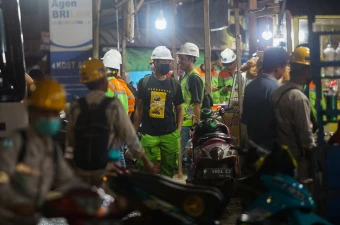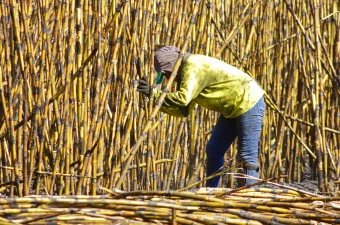By Maurice van Beers
Regional coordinator Latin-America CNV Internationaal
This article probably isn’t directed at you. How many people actually determine a living wage for large companies in the food industry? Just a tiny handful of men and women who work for companies like PepsiCo, Nestle, Unilever, or Coca-Cola. But read along. We all consume sugar in one way or another. Sugar is in our food and in packaging. It’s also in your car’s petrol tank in the form of ethanol. This message is important to all of us.
You and I buy sugar and the people who harvest that sugar cane don’t earn a living wage. It’s like this: Paying an insufficient (piece) wage for the harvesting of sugar cane forces workers in Latin America and Asia to work extremely long days. They work more than 60 hours a week, at the cost of their personal health.
Each sugar cane worker cuts 3000 to 5000 kg of cane each day. This hard work, combined with the tropical heat and a lack of drinking water in the fields, can cause fatal kidney failure. Entire families work, even the children, because that’s what is necessary for them to make ends meet. Of course, child labour isn’t “officially” allowed, but the day-to-day reality is different in this sector. Millions of people around the globe, including children, are working in sugar cane fields every day.
The reason for all of these atrocities is that the workers aren’t getting paid a living wage. Bonsucro, the most important certification standard in the industry, has recently submitted a proposal to include living wage in their new, updated certification standard. It’s a good proposal. A decent wage, a living wage, has to be ensured. It’s a basic human right.
This is still just a proposal. The money to pay all the workers a living wage has to come from somewhere. Who should pay? The plantation owners? The intermediaries? Or should the profits earned in the food industry be reduced? Should the consumer cover the costs?
To get this conversation started, CNV Internationaal organised a webinar for Bonsucro members on October 7, 2020, the World Day for Decent Work. During that webinar, several convincing arguments were made regarding the implementation of a living wage.
First of all, investors are increasingly demanding a guarantee that a living wage be paid in the sectors where they invest. The “Platform Living Wage Financials” is considering adding the sugar industry in 2021. This would mostly be in regard to the bigger companies in the food industry. Questions like: Is a living wage being paid at the start of the production chain? will be addressed. This platform is good for 2.6 billion euros in investments.
Secondly, The European Union has announced that it will launch a legislative initiative for International Responsible Business Practises in 2021. Living wage is indeed included. Various member states, including the Netherlands, are already working on their laws. This is important as the European market is the world’s largest with 500 million consumers.
Both investors and governments are sending out clear signals. Bonsucro also sees how important it is to implement a living wage if we want to eradicate problems like child labour and forced labour.
This means the moment is upon us. We have an enormous opportunity to wipe out forced and child labour. By including the living wage in the new Bonsucro standard, we can get everyone around the world on the same page and create a living wage for sugar cane workers. This is possible if everyone throughout the production chain cooperates. Together we are part of the solution. Together we can take a major step towards creating a truly sustainable and fair sugar cane industry.
That handful of men and women making decisions for big companies in the food industry –the ones I mentioned at the beginning of this article—can play an important decision-making role in creating this sustainability and living wage. By investing in longer, more stable contracts with suppliers. By paying better prices. By offering a premium to producers who pay a living wage. If this group of people shows their willingness, then we’ve taken a major step towards achieving a living wage in the sugar cane industry.
Curious about the webinar? Below you can watch the replay.
To learn more on the subject:
Publication date 06 11 2020


